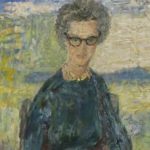
I recall learning of Cicely Saunders’ death in July 2005. It was morning in the Pacific Northwest and I was planning my day of home visits with hospice patients and families. I had greatly admired the woman who created and embodied an approach to care for dying that acknowledged the whole person as they were living. I had heard about her over many years, having practised as a social worker since 1987 primarily focused on providing end of life care in different areas of the United States.
Cicely Saunders inspired the current global palliative care movement that would eventually lead me to change my own career as a hospice social worker – completing a PhD in Palliative Care in early 2018 and becoming a researcher on global interventions at end of life with the University of Glasgow End of Life Studies Group, based in Dumfries, Scotland.
Cicely Saunders is well known for teaching about the concept of total pain as she integrated the professional roles that first defined her as nurse, later as an almoner or social worker, and then as a physician. I believe it was her multi-faceted professional experience that enabled her to acknowledge suffering of the individual is not limited to physical problems. Through her work with those facing death she educated about how suffering from advanced disease requires attention to all aspects of the person and not only the part that can be seen or physically touched.
Perhaps the work of Cicely Saunders can teach us what can be learned about being human at all stages of life when working with others at the cusp of death.
I have found, like many others, that being with — and working with — dying, I face my own mortality, helping me to better live and appreciate life. I now have the opportunity to understand what made Cicely Saunders human, how working with the dying helped her to live – through the newly published biography written by Professor David Clark, founder of the Glasgow End of Life Studies Group.
I was, therefore, honoured to attend the launch of the book at St Christopher’s hospice in Sydenham, outside of London, the hospice she founded over 50 years ago, and on the 100th anniversary of her birth. She seemed to gaze upon the audience from the portrait painted by her husband, Marian Bohusz-Szyszko:
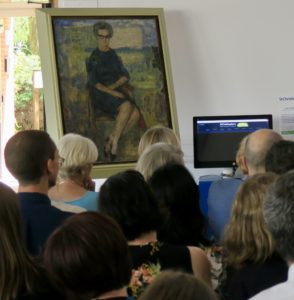 There were several in attendance, including family members and colleagues that knew and worked with Cicely Saunders; but to have parts of her story read in the place the she founded, the hospice where she died, held more purposeful meaning.
There were several in attendance, including family members and colleagues that knew and worked with Cicely Saunders; but to have parts of her story read in the place the she founded, the hospice where she died, held more purposeful meaning.
The last time I visited St Christopher’s, about 5 years ago, I sat with patients and families in the café, the same room as this book launch. Once again I was struck by the swirl of regular operations of the hospice facility going on around me as the guests gathered for the event. St Christopher’s is a living, breathing place, where vital services are carried out in support of patients, families, and the community, including the community attending the book launch.
After a welcome and brief introduction by spiritual care lead, Rev Dr Andrew Goodhead, Dame Barbara Monroe, retired chief executive of St Christopher’s, gave a beautiful summary and review of the book. 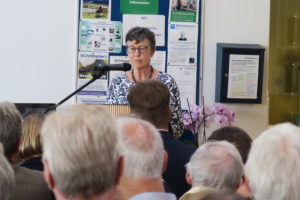
David Clark gave the first of four readings describing how Cicely went from being a wartime nurse who had to change careers due to her failing health. “Despite her fatigue she got on well with some of the officer patients. They asked her to sing ‘One Fine Day’ from Madame Butterfly in a show they were planning. She loved to sing and readily agreed to a practice run”.
As David Clark spoke of his work to help organise Cicely’s multiple boxes of archives and interview her for an anticipated biography, I again witnessed patients and families in the garden, and observed staff members going to and from other parts of the hospice. Living and being with dying continued.
Others read from the biography, including Rose Remedios, who read how as a medical student Cicely “was concerning herself with a group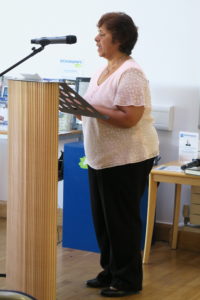 of patients for which medical science had little to offer that was definitive, she was doing so in a way that recognised the widespread social and personal consequences of disease and acknowledged that the relief of suffering depends on engaging with these aspects as well as with the underlying physical causes and their symptoms”.
of patients for which medical science had little to offer that was definitive, she was doing so in a way that recognised the widespread social and personal consequences of disease and acknowledged that the relief of suffering depends on engaging with these aspects as well as with the underlying physical causes and their symptoms”.
Heather Richardson, the current Chief Executive of St Christopher’s introduced the final reading, from Nigel Hartley. He spoke of how Cicely moved from an evangelical world to broadening her views and from the 1940s maintained a spiritually disciplined daily practise of “reading, reflection, and prayer that created a sense, to which she was so committed, that everything could be ‘gathered up’ “.
Damien Falkowski concluded the book launch with a profound solo violin performance of Ralph Vaughan William’s meditative piece, The Lark Ascending.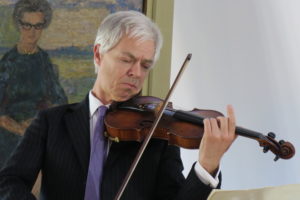 Damien introduced the piece speaking about how Cicely, planning ahead before she died, asked him to play it at her memorial service. He had previously played it at the funeral of Cicely’s husband in 1995 and she wanted it played for her – which eventually happened both at her funeral in 2005 and at Westminster Abbey in 2006. He also repeated the performance at the event, Remembering Cicely, that took place 10 years after her death. Now, on this day, the launch of her biography on the anniversary of her 100th birthday, 22nd of June, it was played again.
Damien introduced the piece speaking about how Cicely, planning ahead before she died, asked him to play it at her memorial service. He had previously played it at the funeral of Cicely’s husband in 1995 and she wanted it played for her – which eventually happened both at her funeral in 2005 and at Westminster Abbey in 2006. He also repeated the performance at the event, Remembering Cicely, that took place 10 years after her death. Now, on this day, the launch of her biography on the anniversary of her 100th birthday, 22nd of June, it was played again.
More can be learned about the life of Cicely Saunders, her influence, and contribution to end of life care around the world by reading the biography.
Photographs: Sheri Mila Gerson
Dr Sheri Mila Gerson is a research associate with the End of Life Studies Group at the University of Glasgow School of Interdisciplinary Studies. She holds a Master degree in Social Work from the University of Chicago and a PhD in Palliative Care from Lancaster University. Her research interests include global interventions in end of life care, assisted dying, health care ethics and policy, and qualitative methodologies.


[…] Dame Cicely Saunders, he has edited her letters and selected publications and his biography of her Cicely Saunders: A Life and Legacy was published to mark the centenary of her birth in 2018. […]